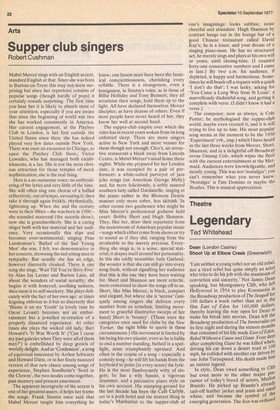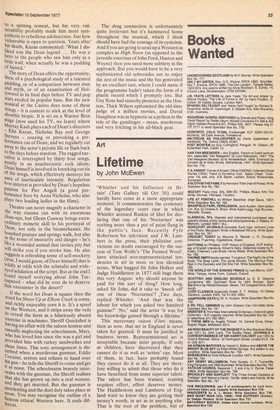Theatre
Legendary
Ted Whitehead
Dean (London Casino) Shoot Up at Elbow Creek (Greenwich) 'I am neither a young rebel nor an old rebel, nor a tired rebel but quite simply an actor who tries to do his job with the maximum of conviction and sincerity.' Not James Dean speaking, but Montgomery Clift, who left Hollywood in 17)54 to play Konstantin the Broadway production of The Seagull fOr 100 dollars a week rather than act in the film East of Eden for 160,000 dollars, thereby leaving the way open for Dean to make his break into movies. Dean left the Broadway production of The Immoralist on its first night and during the sixteen months that remained of his life made East of Eden, Rebel Without a Cause and Giant. Four days after completing Giant he was killed when, driving his car down a desert road at 100 mph, he collided with another car driven by one John Turnupseed. His death made 111111 an instant legend. In style, Dean owed something to Clift but even more to the other major precursor of today's breed of actors, Marlon Brand°. He picked up Brando's alreadY cast-off leather jacket and jeans and nasal whine, and became the symbol of the emerging generation. The lion was reduced to a spitting tomcat, but his very vulnerability probably made him more sympathetic to rebellious adolescence. Just how vulnerable is open to question. Years after' his death, Kazan commented: 'What I disliked was the Dean legend . . . He was a hero to the people who saw him only as a little waif, when actually he was a pudding of hatred.'
• The story of Dean offers the opportunity, then, of a psychological study of a talented Pudding, or of a comparison between man and myth, or of an examination of Hollywood in its final days before TV and pop stars eroded its popular base. But the new musical at the Casino does none of these things it is content to stick at the level of showbiz biopic. It is set on a Warner Bros stage (now used for TV, we learn) where Murray Kash plays each of Dean's directors Elia Kazan, Nicholas Ray and George Stevens coaxing or provoking a performance out of Dean; and we regularly cut away to the actor's private life or flash back to the days before stardom. The ragged narrative is interrupted by thirty four songs, mostly in an anachronistic rock idiom; Dean himself is involved in knocking out six of the songs, which effectively destroys his aura of inarticulate intensity. Regulation love interest is provided by Dean's hopeless Passion for Pier Angeli (a good performance here by Anna Nicholas, who also Plays two leading ladies in the films).
Theatre can never magnify a character in the way cinema can with its enormous close-ups, but Glenn Conway brings extraordinary mimetic skill to his portrayal of r:kan, not only in the biomechanics, the hunched posture and springy walk, but also in the sense of insecurity and danger he's lIke a wounded animal that invites pity but Will strike you if you stroke him. He also suggests a refreshing sense of self-mockery (true, I would guess, of Dean himself) that is Wildly at odds with the schmaltz and wideeyed adulation of the script. But at the end I found myself worrying about John Turilupseed what did he ever do to deserve .that encounter in the desert?
If the word for Dean is square then the word for Shoot Up at Elbow Creek is corny, and richly enjoyable corn it is. It's a spoof on the Western, and it strips away the veils to reveal the form as a hilariously absurd exercise in machismo.' Sheriff Ouickshot is having an affair with the saloon hostess and casually neglecting the schoolmarm, Mary, who has loved him since she was a girl and provided him with turkey sandwiches and Clean linen. This cosy arrangement is disturbed when a murderous gunman, Eddie Cocaine, arrives and refuses to hand over his gun he tells the Sheriff to come and get it at noon. The schoolmarm bravely intercedes with the gunman, the Sheriff realises that she has grown up into a real woman, and they get married. But the gunman is unrelenting and the duel duly takes place at noon, You may recognise the outline of a famous ethical Western here. It ends dif ferent. The drug connection is unfortunately quite irrelevant but it's hammered home throughout the musical, which I think should have had the courage of its cynicism. And if you are going to send up a Western as complex as High Noon (as opposed to the juvenile exercises of John Ford, Huston and Wayne) then you need more subtlety in the approach. But you would have to be a very sophisticated old sobersides not to enjoy the zest of the music and the fun generated by an excellent cast, whom I could name if the programme hadn't taken the form of a plastic record which I promptly lost. But Gay Rose had raunchy presence as the Hostess, Thick Wilson epitomised the old-time judge of a million movies, and David Haughton was as hypnotic as a python in the role of the gunslinger mean, murderous and very fetching in his all-black gear.































 Previous page
Previous page